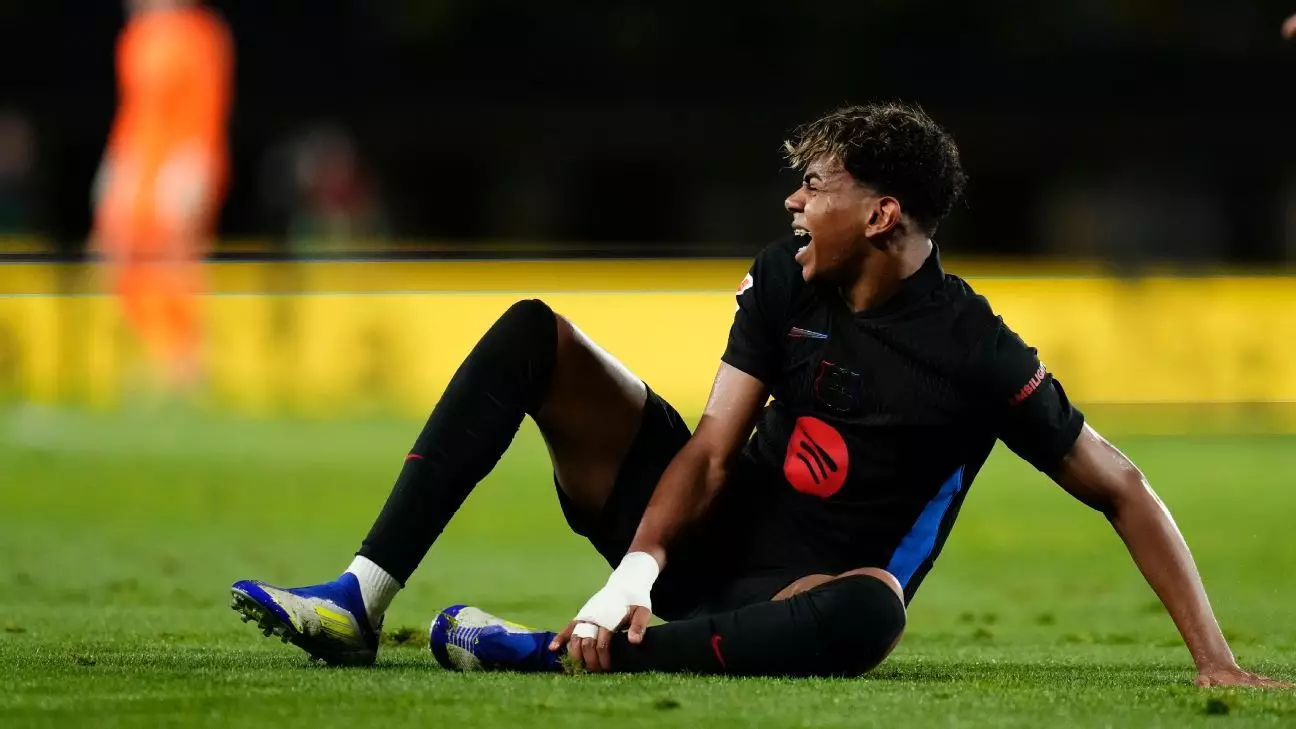As the Copa del Rey semifinal approaches, excitement and anxiety are palpable in Barcelona, especially regarding the fitness of young starlet Lamine Yamal. After a remarkable season so far, the 17-year-old forward has emerged as a central figure in Hansi Flick’s game plan. However, his recent injury concerns, stemming from a rough outing against Las Palmas, cast a shadow over his availability for the crucial match against Atlético Madrid. He was seen limping off the pitch, and a graphic image of his injured foot stirred concern among fans. Fortunately, Flick remains optimistic, stating that both he and the medical team believe Yamal might be fit to play. This hopeful outlook emphasizes the coach’s reliance on Yamal’s unique talent to exploit Atlético’s defensive weaknesses.
In the wake of the incident that led to Yamal’s injury, a chorus of voices, including that of Flick, has emerged demanding better protection for attacking players from referees. Yamal’s social media posts, laced with humor yet underscored by frustration, speak volumes about the current climate surrounding player safety in Spanish football. With Yamal, Raphinha, and other skillful attackers facing disproportionate physical challenges, there is a growing need for stricter officiating to safeguard these creative forces from overly aggressive defenses. Flick stresses that while it’s crucial to protect standout talents, the ethos of safeguarding players should extend across the entire roster, reinforcing the accountability of referees to uphold the spirit of the game.
With Barcelona currently leading La Liga alongside Real Madrid and just a point ahead of their upcoming rivals Atlético, this match serves as a pivotal contest not only for silverware but also for psychological dominance as the season progresses. Having faced Atlético on home turf in December and coming away with a narrow defeat, Barcelona will draw on lessons that can be learned from that match, including their ability to perform well under pressure despite not securing a positive result. Flick’s emphasis on maintaining high performance levels is telling. He recognizes the formidable nature of Atlético’s game; a robust defense complemented by a potent offensive lineup poses one of the sternest tests this season.
Diego Simeone, Atlético Madrid’s head coach, embodies strategic prowess and adaptability. His approach involves knowing when to soak up pressure and when to launch incisive counterattacks. Simeone has imparted a clear direction to his team on how to play against formidable opponents like Barcelona. The tactical duel between Flick and Simeone in this semifinal promises to be not only a clash of foot skills but also a captivating display of footballing intellect. The ability to adapt mid-game will be crucial, as both teams are likely to face moments of intense pressure. Simultaneously, this is also an opportunity for each squad to showcase their resilience and creativity.
Looking Ahead to the Second Leg
With the conclusion of the first leg not determining the outcome of the semifinals, both teams remain acutely aware that the return leg could shift the balance in their favor. Set to take place in early April at the Riyadh Air Metropolitano, this second fixture will serve as a key determinant in the overall competition. Players will not only strive to impress in the immediate match but also plan strategically for the deciding leg that looms ahead. Factors such as squad rotation and injury management will be critical as both clubs navigate this intense dual-threat format in pursuit of the coveted Copa del Rey trophy.
The first leg against Atlético Madrid is just as much about the tactical display and potential player absences as it is about the desire for triumph. With Yamal’s status lingering as a focal point amid broader issues of player safety and strategic planning, Barcelona aims to rediscover its stride in a tournament where every moment counts. As the teams prepare to clash, the anticipation builds, encapsulating the essence of high-stakes football in Spain.

Leave a Reply